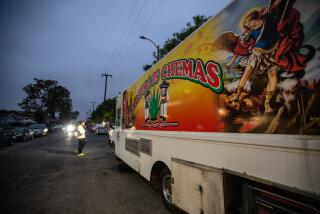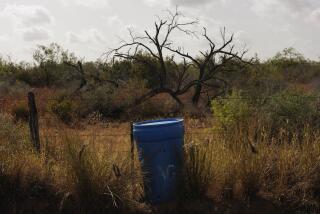The Rancid Riches of Texas’ New Range War
- Share via
HOUSTON — Oil is king in Texas.
Only the black gold that’s got wildcatters in a lather these days isn’t pumped from the ground. It’s drained from the kitchen. The market for used restaurant grease--rancid, frothy, bowels-of-hell Frymaster oil--is big business here, a multimillion-dollar trade that’s often as nasty as the product that feeds it.
Not many people spend their time pondering the fate of dirty cooking oil, nor do many care to, especially after downing a super-sized order of fries. But the rendering industry lives off of that waste, recycling it in ways that many people also probably don’t care to ponder--as an additive in soap, cosmetics, lubricants and livestock feed, among other uses.
To retrieve the goo, the largest renderers sign contracts with restaurants, installing grease vats in kitchen alleys and paying a few cents per pound every time they come for a load. That arrangement, however, rarely goes unchallenged. In a testament to the boundlessness of the entrepreneurial spirit, rogue haulers often snatch the grease before the big companies can get there--a phenomenon that has led to criminal probes, civil lawsuits and other charges of slippery commerce.
“Anywhere there’s grease, there’s going to be grease thieves,” said Vernon Stewart, director of the Texas Renderers Assn., which is lobbying for stricter laws against illegal grease vendors, some of whom pocket hundreds of dollars a night. “It’s sort of a crude way of making a living. But any time you have a profit like this, you’re going to find dishonest people filling the void.”
These skirmishes exist throughout the country, including California, which is home to the official industry magazine, Render. Yet for reasons that can’t be entirely explained, the Lone Star State is considered the front line of America’s grease wars. (One theory: the deep-fry is sacred here, a piece of equipment that few restaurants dare do without. Another theory: It’s so darn hot that the used fat never congeals, allowing nocturnal crooks to swiftly drain an outdoor vat, even in wintertime.)
“There’s some thievin’ going on here and there around the country, but nothing like we got in Texas,” said Al Cuellar, a security officer for Kentucky-based Griffin Industries, one of the nation’s largest renderers with more than 50,000 kitchen-grease accounts in 16 states.
This week in San Antonio, and last week in Houston, Cuellar’s gumshoe work led to a series of indictments and arrests that constitutes one of the biggest grease busts in the history of the rendering industry, not that many cases had been competing for that crown. Using an undercover grease policeman and a confidential grease informant, authorities secretly tape-recorded transactions with four suspected grease fences--rendering plants that buy the oil from independent haulers, no questions asked. Seven people were charged with receiving stolen property.
“When you hang out a sign that says, ‘I Buy Grease,’ it’s like an invitation to steal,” said Cuellar, a retired Texas Ranger who brought his suspicions to the state Department of Public Safety, which conducted the sting. “If you didn’t have the unscrupulous buyers, the thieves wouldn’t have anybody to sell to.”
But even as Griffin Industries was applauding the crackdown, a Houston defense attorney who calls himself the “grease lawyer” was putting his own spin on the matter.
“Their whole deal is to run the little guys out of business,” said Jon Jaworski, who estimates he has represented nearly 100 accused grease thieves, including two of the renderers arrested last week. In a 1991 lawsuit, he made a similar argument, accusing Griffin of “conspiracy” and “a pattern of racketeering.” Then and now, Jaworski contends, the firm has employed ex-cops to harass and intimidate mom-and-pop grease dealers, wielding the threat of prosecution in an effort to monopolize the trade.
“This is all part of a plan,” he said. “It’s about wiping out the competition.”
Bob Griffin, vice president in charge of Texas operations for the family-owned firm, denied any such scheme. “Good competition is good competition,” he said. “But you can’t compete against a thief.”
He noted that his company prevailed in that 1991 lawsuit, which resulted in injunctions banning more than a dozen grease thieves from even touching a Griffin container. The ringleader, who Jaworski represented, was also ordered to pay more than a $1 million in damages, but declared bankruptcy instead. “We’re just trying to protect what is ours,” Griffin said.
To the extent that there is a problem in the way grease is policed, say industry watchdogs, it’s that few law enforcement agencies are willing to take the subject seriously. In the shadows of a restaurant alley, an oil barrel looks about as exalted as a garbage can. You’d think people would be happy just to have it taken off their hands.
“After all,” said Cuellar, summing up the prevailing attitude, “it’s just grease.”
But if one man’s trash is another man’s treasure, used kitchen oil can be a mother lode. A poacher can earn 7 to 14 cents a pound, depending on the demand for rendered grease, which is bought and sold each day on the commodities market. It wouldn’t take much for an industrious thief to loot 10 oil barrels, each weighing 400 pounds, in a single night--and be about $400 richer by morning.
Griffin Industries estimates that it loses at least $10,000 a week in Houston alone.
Still, it’s one thing to fume about missing grease and another thing to prove that someone stole it--a fact that frustrates the legitimate companies and emboldens their shady competitors. Who actually owns the stuff? Did anyone report it missing? How can it be identified? Even if a suspect is apprehended, what evidence is there of a crime? Where, when and from whom was the grease heisted?
“If I call the police, what are they going to do? They’re going to laugh at me,” said Mike Lyras, manager of Brown Sugar’s BBQ in Houston, which has been hit by grease thieves so many times that he’s lost count. “I laugh myself.”
Most of the outright theft--in which locked containers are pried, cut or blow-torched open--occurs at night with few witnesses around. Sometimes, if there is no lock, restaurants don’t even know that their vats have been tampered with. Only when the rendering company that installed the container arrives for its grease may anybody discover that there’s less than a full load.
Daylight hustlers can be a bit slicker. Rather than grubby bandits ladling bucketfuls of grease into their trucks, uniformed drivers from licensed companies occasionally pull up to the kitchen, pump the grease out with a vacuum hose and stick a receipt on the door--before anyone inside realizes that it’s not the same renderer with whom the restaurant has a contract. Bootleg haulers have even been known to offer money, slipping a $20 to, say, the dishwasher, in exchange for looking the other way.
“If we do catch them, there’s no consequences to pay,” said Kelly Horton, a security officer with Double E Resources, a Fort Worth-based renderer. “One guy, I’ve arrested him 14 times in the last two years. But then you go to the DA or the county attorney, and they look at the case and think: ‘Grease? Man, get this outta here.’ ”
The Texas Department of Health, which regulates the state’s rendering industry, has almost no power to intercede. Although it issues grease-hauling licenses, just about anyone with a leakproof truck and the $150 annual fee can get one, even if they’ve been convicted of theft. In fact, some rendering firms complain that the whole process bestows an aura of legitimacy on crooks, who can always flash their Texas Renderer’s Licensing Act number if they’re ever stopped by police.
“We license them to haul grease,” Bob Blackwell, head of the health department’s rendering unit, said with a sigh. “We don’t license them to steal grease.”
California has a somewhat stricter program, launched in 1995 and run under the aegis of the state Department of Agriculture. The licensing fee is twice that of Texas, and the extra money is used to fund a full-time detective. His work has placed several grease thieves on probation and brought in more than $18,000 in fines, yet after nearly three years of sleuthing, nobody’s been sent to jail and no licenses have been revoked.
“What we’re after is compliance with the law, not to put people out of business,” said Dennis Thompson, chief of the department’s meat and poultry inspection unit, which oversees the program. After all, the rendering industry “is really a boon to society,” he added. “It’s important that this grease be conserved and reprocessed, not dumped down our drains and into our rivers and lakes.”
The recent busts in Texas represented a rare attempt to disable an entire segment of the industry--not the thieves, but the renderers to whom they sell their stolen grease.
One morning last week, police swooped down on Imperial Grease Service in Houston with warrants for two of its managers. Dozens of metal barrels, some overflowing with oily sludge, filled the corrugated shed. Fat blanketed the concrete floor, causing some of the officers to briefly lose their balance. Despite a battery of industrial fans, the air was heavy and foul.
(Even Jaworski, the grease lawyer, forces his clients to cover their shoes and sit on towels when they visit his office. “It’s like the stench of death,” he said.)
Unbeknownst to Imperial Grease, an undercover cop had already been here, accompanied by a former grease thief who turned state’s evidence after being snared in a separate incident. A hidden microphone recorded their conversations. “They just walked in and said: ‘We got a load of stolen grease,’ ” said Texas police Capt. Robert Petty, head of the region’s special crimes unit. “In this case, the response was, ‘I don’t care where you get it. Bring all you got.’ ”
But Gerardo Bermudez, a supervisor at the loading dock, noted that all grease haulers must sign a voucher at the time of sale, expressly stating that their grease is not stolen. “Maybe the guy stole it, maybe he didn’t. How can I know?” said Bermudez, who was not targeted by police. “I just do my job and mind my own business.”
Another Imperial Grease employee, Michael Noel, contended that the entire raid was “a dog-and-pony show” orchestrated by Griffin Industries, which sent its security officer, Cuellar, to monitor the proceedings. “We’ve offered competition and they don’t like that,” said Noel, whose company emblazons its trucks with the slogan: “You do have a choice.”
As if to demonstrate the fuzzy line between larceny and free-market rivalry, a self-employed grease hauler rumbled up in a rusty old truck and began unloading oil barrels just as police were arriving.
“Where did you get this grease?” an officer asked him.
“From restaurants,” the man said.
“Have you taken grease without permission?” he was asked.
“This week, or in my entire life?”
“Do you pay the restaurants?” he was asked again.
“Some, but not all.”
“Do you have any receipts.”
“Not with me.”
“Is any of this grease on this truck stolen?”
“No, they let me have it.”
The man had no way to prove that the grease was rightfully his and the police had no way to prove that it wasn’t. When they left, he went back to work, putrid oil slopping over his rubber boots.
More to Read
Inside the business of entertainment
The Wide Shot brings you news, analysis and insights on everything from streaming wars to production — and what it all means for the future.
You may occasionally receive promotional content from the Los Angeles Times.










